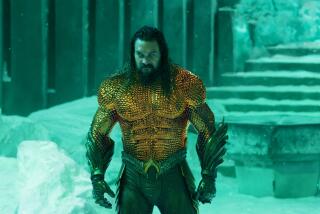Analysis: Hollywood’s box-office woes: Is the industry aiming too narrowly at men?
Another weekend, another branded movie struggles.
Hollywood’s so-called franchise fatigue hit for what seemed like the umpteenth time this year, as “Spider-Man: Homecoming” followed up its auspicious domestic debut July 7 with just $45 million in ticket sales (a 61% drop) this past weekend. That paved the way for the movie to lose what many thought would be a tight opening-weekend battle with “War for the Planet of the Apes” — incidentally, an underperformer in its own right. And it raised the question, once again, of why so many supposedly surefire hits can’t seem to stick.
Many big-budget live-action movies over the last few months have been dropping at a dismal rate — at least 55% — in their second weekends. That includes films that had strong starts, such as “Spider-Man,” “Guardians of the Galaxy Vol. 2” and “The Fate of the Furious.” And it includes titles that didn’t, such as “Transformers: The Last Knight,” “Pirates of the Caribbean: Dead Men Tell No Tales” and “Alien: Covenant” (the last one falling a whopping 70%).
Clearly the geriatric age of some of these franchises is a factor — both “Pirates” and “Transformers” are on their fifth installments, and “Alien: Covenant” is even longer in the tooth, depending on how you classify some earlier entries. But it doesn’t explain why “Apes,” at just its third iteration of its current cycle and with some of the best reviews of its life, had such an underwhelming opening of $56 million. Or why “Spider-Man” couldn’t parlay its strong debut into a better second weekend..
The simple explanation is that audiences don’t want to see movies with titles and characters they’ve seen before. They may turn out that first weekend, either because they’re predisposed to like the franchise or they’re bludgeoned into seeing the film by relentless marketing. But give them a little time to think about it and they’ll turn away. These second-weekend plummets are part of why box office overall is down nearly 10% compared with last year and why executives all over town are wringing their hands.
But it turns out some films are inoculated against franchise fatigue.

Emma Watson, Dan Stevens and Luke Evans star in the live-action movie “Beauty and the Beast.”
Of the big-budget movies in the 2017 box-office top 20, two live-action films actually have managed to hold off the scourge of the 50% drop: “Beauty and the Beast” and “Wonder Woman.”
The staying power of the former has helped put it at more than half a billion dollars domestically and given it a massive lead as the highest-grossing film of the year. (No other movie is even within $100 million.)
The latter, from DC and Warner Bros, had shown such endurance it only just fell out of the top five this past weekend, its seventh in release. Patty Jenkins’ film — the first major superhero movie directed by a woman — experienced a drop of just 43% in its second weekend, and then 29% the following weekend. People have come out to see “Wonder Woman” long after its initial hype has faded. Sometime in the coming days, the film will ascend to the No. 2 slot for the year.
Yes, a superhero title that some in Hollywood were skeptical about even making — “would men come?” was the gist if not the literal refrain — is about to be the highest-grossing film of the summer.
All of this should lead the entertainment industry to a very clear conclusion about its box-office blues: There are simply too many men and not enough women on screen to earn back the money these big-budget films demand.
There’s long been a sense among pundits that the studios’ single-minded pursuit of young males is misguided.
There’s long been a sense among pundits that the studios’ single-minded pursuit of young males is misguided: As a group, they’re too elusive, and chasing them can too often lead to a race to the bottom aesthetically. But that was just a feeling. This summer is providing hardcore forensic proof.
Men can still drive hits, of course; “Guardians,” which is male-led, has earned over $386 million domestically and jumped slightly ahead of its unexpectedly potent predecessor. And some modestly scaled offerings, such as the sleeper hit ‘Baby Driver,” are male-driven. But as reliable tent-pole business, men are becoming ever-dicier.
An old saw about movies aimed at teenagers (YA films, in industry parlance) had it that girls will see movies with boy leads but not the other way around. Hollywood held on to this way of thinking for an alarmingly long time — until recently, when “The Hunger Games” proved it untrue. It’s males who will actually cross over to see a YA action movie with a female lead, even as more women than ever will come out if the heroine is also a feminist icon.
The big-budget summer box office is now proving this true on a tent-pole level too, and in fact is reversing the saw. Movies with women at their center, whether musical love stories or kick-butt action films, can double down on females and attract plenty of males too. (Opening weekend for “Wonder Woman’ skewed female, but not by nearly as much as you’d think — the audience was 53%-47% in favor of women.) Movies centered on a lot of men? They have a ceiling.
The overperformance of female-driven tent poles this summer is the next phase of a trend that has been picking up momentum in the years since “The Hunger Games.” Last year’s highest-grossing movie, after all, was also a woman-led action picture, “Rogue One” (with admittedly a boost from the ‘Star Wars” brand).
At least part — though probably not a very big part — of these movies’ success may be due to novelty. Female-driven action adventures are still uncommon enough that the very fact of their existence is likely to be a selling point for a certain portion of the audience. It remains to be seen what will happen as more such movies enter the marketplace — it’s not as simple as just cranking out a dozen “Wonder Woman” or “Beauty and the Beast” copycats, or dropping a well-known actress atop any splashy effects movie. (See under: “Ghost in the Shell.”) But for now, there’s an unmet demand and studios are only beginning to satisfy it.
What all this means for the future of franchise Hollywood remains to be seen. Marvel has signed on for its first female-superhero movie, Brie Larson’s “Captain Marvel,” though it’s not hitting until 2019. On the diversity front, it also finally has a film with many African Americans both in front of and behind the camera, thanks to ‘Black Panther,” due in early 2018 — it’s the 18th movie in the Marvel Cinematic Universe. Hollywood adjusts course slowly, methodically, non-wokeishly.
But all of this is about more than just the diversity debate, important as it is. The lesson of the summer is that putting women at the center of a film is not only good politics — it’s good business. And, it turns out, a pretty potent remedy for franchise fatigue.
See the most-read stories in Entertainment this hour »
Twitter: @ZeitchikLAT
More to Read
Only good movies
Get the Indie Focus newsletter, Mark Olsen's weekly guide to the world of cinema.
You may occasionally receive promotional content from the Los Angeles Times.







